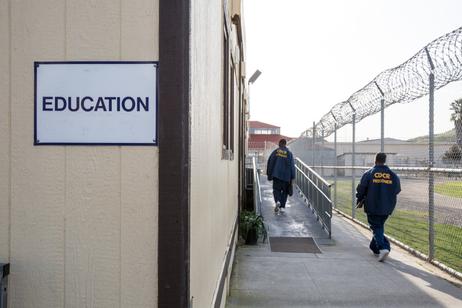While many community colleges have educational incentives to provide reform for convicted criminals, some political leaders are taking an opposing stance. According to recent reports from the San Francisco Chronicle, “Some of the nation's worst sex offenders will no longer be eligible to receive generous educational financial aid packages while they are confined in treatment centers under a bill approved by Congress.”
As political leaders and college presidents strive to balance their budgets amidst a struggling economy, one of the first programs to be eliminated is the financial aid and grants that were available for individuals guilty of serious crimes.
This TEDTalk looks at the issue of prisoner education.
Fighting for Reform
In exploring the recent amendments denying convicted criminals of free tuition and grants, one must first understand how these free college opportunities were even initially created. In truth, allowing convicted criminals to gain access to free publically funded courses was a mere oversight in a much larger educational overhaul. As The Hoya, Georgetown University’s central newspaper, explains, the House of Representatives passed a bill to reauthorize the Higher Education Act in 2008. This act was reinstated in order to provide individuals with enhanced financial aid benefits, and the act allowed individuals to access aid with fewer obstacles and hassles. As a result of this bill, students were able to apply for and receive federally funded student aid Pell Grants throughout the entire year.
Unfortunately, while most students found the Higher Education Act to be highly beneficial, experts failed to see the implications the bill would have on criminals guilty of serious crimes and actions. As the San Francisco Chronicle further reveals, due to this oversight, “Dozens of rapists and child molesters have taken higher education classes at taxpayer expense while confined to treatment centers.”
This video reports on the value of prison education.
The Shocking Loopholes
On behalf of the United States Department of Education, a spokesperson admits that the department did not know how many serious convicted criminals could take advantage of the grants; however, experts predict that by eliminating this accessibility to the funds, taxpayers should be able to benefit from millions of dollars in savings. Specifically, many US Senators, such as Republican representative of Florida, Ric Keller, publically denounced the oversight in the bill, arguing that allowing serious criminals to access free funds for school was “’The most insane wasteful spending program in America.”’ In fact, Keller reported that some offenders were able to use the Pell Grant funds and financial aid in order to purchase leisure items, including DVD players, CDs, and in some cases, even clothes.
In even more astonishing reports, some convicts simply pocketed cash from financial aid. For example, as the San Francisco Chronicle reports, some convicted sex offenders at a treatment center in Wisconsin reportedly pocketed up to $1,000 from Pell Grant money in order to help pay for “living expenses.” These “living expenses” in prison, however, were already funded by tax dollars, making the additional Pell Grant dollars underserved and inappropriately used.
Other reports argue that excess grant funds were pocketed when some grant recipients enrolled for classes and then quickly dropped their courses, allowing the individuals to retain the grant money once the college reimbursed a student for his or her dropped courses.
The Other Side of the Financial Aid Coin
While these loopholes in the legislative act are certainly upsetting, there are still voices protesting reform. Specifically, “Critics say the new measure will cut off the possibility of higher education for offenders who are trying to rehabilitate themselves. The lack of education could hurt their chances of succeeding if they are ever released.”
One well-known critic, Michael Macleod-Ball, who serves as the chief legislative and policy counsel for the American Civil Liberties Union, argues that Congress could have made specific alternations to the program, instead of cutting off funding for convicted criminals altogether. Others further assert that leaders should have sought to cease the abuse of Pell Grants in order to provide every eligible student, regardless of their criminal record, an opportunity to advance themselves through college courses.
Despite the opposing views, however, the National Association of Student Financial Aid Administrators’ Vice President, Larry Zaglaniczny, proclaims that the reported misuse of public grant funds on behalf of some convicted criminals has “undermined public support for the program,” making the recent reforms and revisions essential for collaborative progress and cooperation.
Questions? Contact us on Facebook. @communitycollegereview















